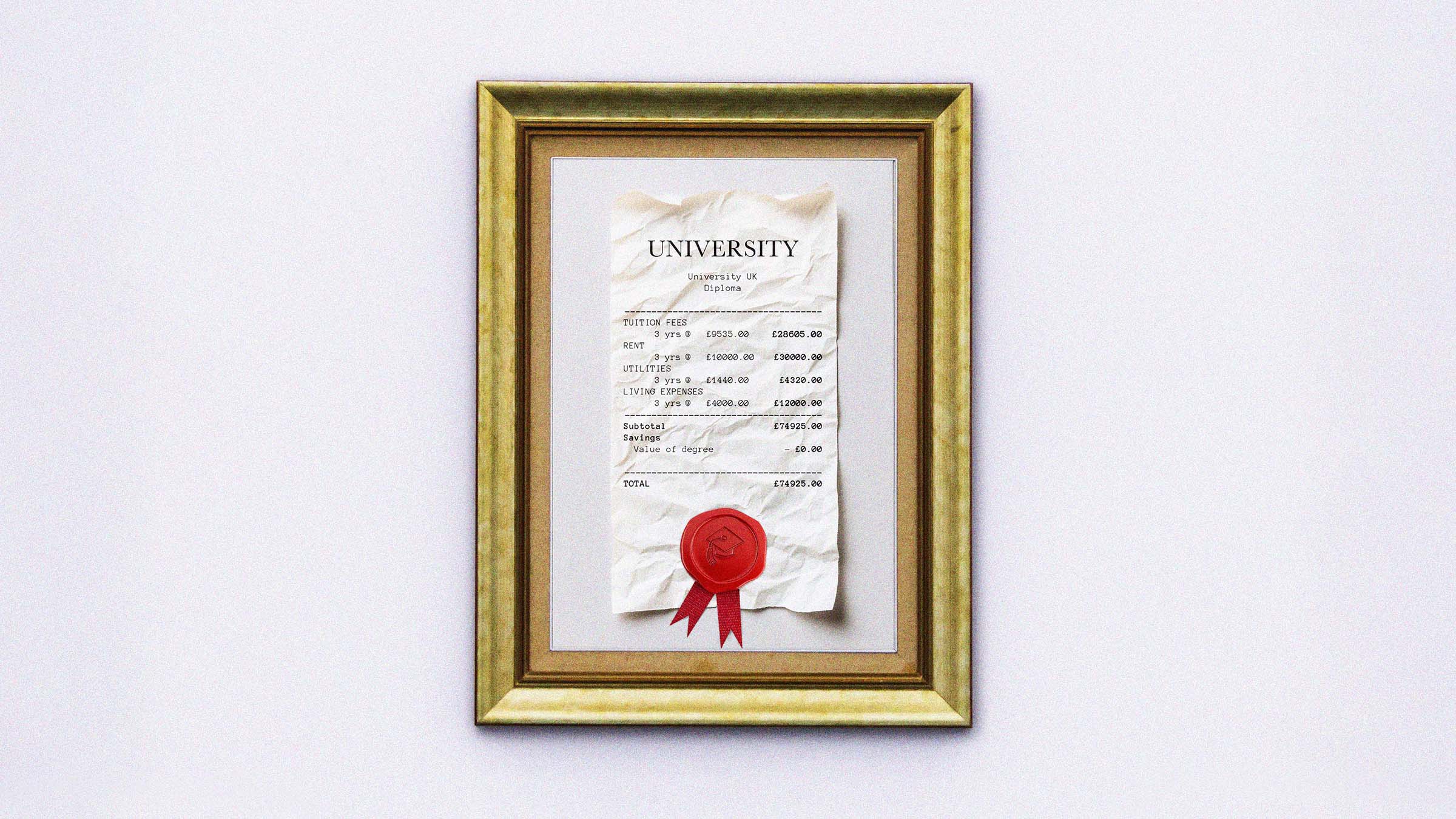Scroll through TikTok and it doesn’t take long to find graduates venting their frustration. “I have applied to 65 jobs since graduating and only had 2 interviews! I have a first-class honours degree, have completed 3 internships, and have been working since I was 14. WHAT. AM. I. DOING. WRONG?” read one recent post. Within 24 hours, it had more than 20,000 likes.
Another read: “Starting to think the troops who left school early and went straight into the trades r [sic] the real winners. A skill set and a job for life that they didn’t put themselves into debt for” read another.
This boils down to a conversation being had across social media, the pages of national newspapers and kitchen tables across the country: is university worth it any more? Ever since English and Welsh students were made to shoulder substantial tuition fees – the next intake will pay £9,535k per year – the relationship between student and institution has fundamentally shifted. They became paying customers, and their degree has become the product.
But in 2025, it’s a product that seems to be exponentially increasing in cost, while exponentially decreasing in value, for three main reasons: declining graduate prospects; their diminishing status as a place for higher learning; and the shrinking of student life.
Among dozens of my friends leaving university this year, only three are heading straight into employment. The rest are either going on to further study or taking a gap year before doing so – in their own words, to avoid the inevitable hellscape of the grad job market. For those of us who have braved the post-university job application humiliation ritual, we know we should be grateful to even get a rejection letter, and to try not to have a breakdown when our parents send us 8,000 articles about graduates on universal credit or AI replacing interns.
Graduates have been operating under the assumptions of their parents’ or even grandparents’ generation: that university was a golden ticket into a job. Back then, the risk/reward calculation was simple – there was no financial risk, and the potential reward was huge. Now the numbers tell a very different story: 36% of degrees fail to deliver an average salary above £30,000 within five years. The average debt for those finishing their course in 2024 was £53,000. Graduate-level job vacancies have fallen from around 7% of all jobs in 2018 to just 4% today. All told, these figures don’t exactly scream reasonable return on investment.
Several recent graduates spoke to me about the dilemmas they’ve faced, but asked to remain anonymous. Declan, who studied PPE at Oxford, feels that “the amount of effort just to find internships meant I felt myself choosing between putting effort into studying or job applications. Which got increasingly more difficult when I began to realise that without an internship return offer, your chances of getting any employment after uni were incredibly slim. It’s like fighting for scraps”
Around 40% of the population now has a degree, meaning that it’s no longer a shining standout on your CV; it’s the bare minimum. What employers really want is experience: internships, part-time work in a relevant field alongside studying and involvement in extracurriculars.
But for students who have to work just to afford their rent, there’s no time to amass that experience. If you already come from a more affluent background, you start with a built-in advantage: you can afford unpaid internships over the summer or live with your parents rent-free if you’re from London (home to most internships and grad schemes), instead of shelling out for accommodation. When it was free, university was a social leveller; now it’s tens of thousands of pounds of debt that still rewards those with the most disposable income and connections.
The statistics and stories have been shared countless times and won’t come as a huge surprise to those outside the current graduate world. Many will disagree with the idea that university’s singular goal is to get you a job, and thus all the bellyaching about the graduate job market devalues the true purpose of university: the opportunity to socialise with peers, learn to live independently and develop critical thinking. But as it turns out, these tenets of student life are also rapidly disintegrating.
We might be five years past the first lockdown, but so many hangovers from that era continue to permeate student life: remote exams, attendance being non-compulsory, online classes. Add the fact that student mental health is at an all-time low and those most at risk of isolation are in some ways being allowed, or encouraged, to retreat from society.
Nearly three-quarters of students report feeling lonely, while 17% feel they have no university friends at all, according to a study by Cibyl. This could also be down to skyrocketing rents. More than a third of students now live at home to afford the costs of university.
Patrick, who lived at home for three years while completing his degree in London, says: “You miss out on some of the most crucial and formative experiences of university life such as living in halls. Without that, it becomes much harder to make friends and create a network of people around you.” Gen Z are statistically far less likely than previous generations to go out drinking and have casual sex: practices central to the traditional cultural idea of a “university experience”.
Suggested Reading


AI versus the universities
Faced with mounting financial pressures, many UK universities are increasingly reliant on international students, whose fees are often two or three times higher than those paid by domestic students. At UCL, for instance, 76% of revenue in 2021/22 came from international students, and between 2015 and 2022 the university enrolled over twice as many international students as UK home students.
But a BBC investigation found that this dependence has led some institutions to accept students with limited English proficiency, waiving standard requirements in the scramble for overseas fees, which can create self-contained communities on campus. One popular Reddit post from a UCL master’s student described feeling excluded in group projects when peers defaulted to speaking Chinese; other students report classmates relying on live translation apps in lectures or Google Translate for coursework. When large groups can study and socialise around campus without engaging much in English, the potential for cross-cultural exchange – one of the strongest arguments for internationalisation – is lost and divisions harden.
In my final year of university, I had six contact hours a week and my taught classes ran from October to April. I was able to delve deep into my love of 19th-century American history and had fantastic tutors to help me, but others on my course felt short-changed.
Nina, who also studied history, found “there was little opportunity to inquire about random things for the sake of curiosity, or time to discuss ideas that didn’t relate to an exam or essay question. And that’s not the tutor’s fault; it’s that you always feel like you’re working towards a fixed end and so there was no space for passion, only passing my degree.”
But it’s not just that lectures, resources and classrooms are stretched so thin that staff can’t properly teach – it’s that many students are actively choosing not to learn. Nine in 10 UK university students admit to using ChatGPT.
In 2023/24 alone, there were almost 7,000 proven cases of AI-assisted cheating. Anyone my age will tell you that number is laughably low. The real figure is far higher than professors can imagine.
People use AI to summarise readings, draft essay plans and in plenty of cases, write the entire thing. It’s no surprise that chatbot usage plummets in the summer months when there’s no homework being assigned. Everyone talks about the financial crisis in higher education but the bigger question is this: what’s the point of getting an academic degree when half the credit should really go to ChatGPT?
University is truly what you make of it. Many take full advantage, and no one should be denied the opportunity to seek further education. But our current system cannot cope with growing demand and neither can the students in it.
More students without more funding means even fewer contact hours and more graduates flooding an already saturated job market just ramps up competition and unemployment. The student loan system is already broken; at the bottom 50 universities, fewer than 5% of students ever pay their loans back in full. There are alternatives to university that could work brilliantly for many, but these need to be shouted about and shaped to fit what people actually want.
Apprenticeships are quietly catching up to, and in some ways overtaking, the traditional degree route. Five years after qualifying, apprentices take home a median salary of around £28,000, not far off the £29,900 earned by graduates.
The difference is that apprentices are earning while they train, rather than taking on debt to study and cover living costs. They are also moving into higher-level, better-paid fields, with the average value-added per apprenticeship rising 44% since 2012/13. Over the same period, the value-added for classroom-based learners has dropped by 25%. The gap between the two paths is narrowing fast and the old assumption that university automatically puts you ahead no longer holds up.
Adam, who took a civil service apprenticeship in the north-east, believes that “it has given me a significant head start to my career and wider life. Besides the obvious benefits, such as pay and qualifications, my apprenticeship has broadened my general life skills and allowed me to set up a professional network.”
Suggested Reading


Nerd’s Eye View: 16 things you need to know about exams
However, he conceded that he has had to miss out on social events and compromise on the classic “young” lifestyle while working long hours and living at home. One of the main drivers for pursuing a university education is the opportunity to leave home, live with peers and have access to a social world built for you. If apprenticeships facilitated more of this kind of lifestyle – with, say, subsidised group housing and apprentice clubs and societies – there may be a much higher uptake. Which equates to fewer young people in debt and less strain on the university system.
Can we look elsewhere for inspiration? In France and Germany, tuition fees are either negligible or non-existent; higher education is seen as a public service, funded mostly through taxation, and there are rigorous academic entry requirements. The flipside of this is that places are limited, courses can be intense and student life is sometimes less “campus-centric” than in the UK. Germany offers many vocational pathways alongside academic routes, giving students genuine alternatives without the social stigma of choosing one over the other.
The US represents the other extreme. Tuition fees are often far higher than in the UK, and student debt is a crippling issue for so many graduates. Yet American universities benefit from vast endowments, deep alumni networks and a culture of philanthropism that sustains research and facilities. Crucially, the strength of these university connections often translates into employment opportunities, something UK universities, outside a small Oxbridge/London elite, struggle to match.
For England and Wales (Scotland has no tuition fees at all for students already resident in the country and Northern Ireland has a different system), neither model is directly transplantable, but elements could be adapted. From Europe, we could take lessons on reducing the overproduction of graduates by increasing selectivity and offering equally prestigious vocational pathways. From the US, we could aim to build stronger alumni engagement and encourage philanthropic support to reduce dependency on tuition fees and a smoother transition from study to work.
My life would have been poorer had I not gone to university. The friends I made, the opportunities I encountered, the ways I grew – I wouldn’t trade them. But that doesn’t change the reality that the current model is creaking under its own weight. A degree no longer guarantees good employment; underfunding and overcrowding are eroding the quality of teaching; disengagement is rising; and for many, the cost of living has gutted the social side that once made it a rite of passage.
Universities still matter, but they’re no longer the sole ticket to a good life and pretending otherwise traps young people in debt while shutting them off from other paths. If university is going to be worth the cost – financially, academically and socially – it needs a fundamental change. And fast.
Lucy Reade won best comment piece at the 2025 Student Publication Association awards




